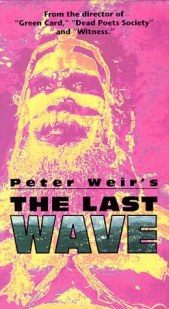 Starring Richard
Chamberlain, David Gulpilil, Olivia Hamnett, Nadjiwarra Amagula, Frederick Parslow.
Starring Richard
Chamberlain, David Gulpilil, Olivia Hamnett, Nadjiwarra Amagula, Frederick Parslow.
Written by Peter Weir, Tony Morphett, Petru Popescu.
Directed by Peter Weir.
 Starring Richard
Chamberlain, David Gulpilil, Olivia Hamnett, Nadjiwarra Amagula, Frederick Parslow.
Starring Richard
Chamberlain, David Gulpilil, Olivia Hamnett, Nadjiwarra Amagula, Frederick Parslow.
Written by Peter Weir, Tony Morphett, Petru Popescu.
Directed by Peter Weir.
Grade: B-
Review by Carlo Cavagna.
Like many Peter Weir movies, The Last Wave explores the conflict between two radically different cultures--in this case, that of Aboriginal Australians and the white Europeans. And, like many Peter Weir movies, The Last Wave has a slightly otherworldly feel to it from the beginning. The movie opens in the Australian Outback, where a town under a perfectly clear blue sky is suddenly struck by a hail storm. This event is seemingly unconnected from the rest of the story, which takes place in Sydney, where corporate tax lawyer David Burton (Richard Chamberlain) is compelled to defend five Aborigines accused of murdering another Aborigine outside of a bar. At first the case seems straightforward, even though the Aborigines are unwilling to talk to Burton and the cause of death is unclear. Then one of the Aborigines, Chris (David Gulpilil), starts showing up in Burton's dreams.
Burton eventually begins to suspect that the five Aborigines may be members of an underground tribal group, even though no tribal Aborigines have lived anywhere near Sydney for ages. He becomes obsessed with the mystery as his family and his life disintegrates around him. He comes into contact with Aboriginal myths and a system of perception called "the dream time." The actors who play the two main Aborigine characters, David Gulpilil (Walkabout) and Nadjiwarra Amagula, are themselves tribal Aborigines. In fact, Amagula, who plays Charlie, an enigmatic man somehow connected to the five accused, was a clan leader discovered by Weir specifically for this movie.
The Last Wave is similar to Weir's previous film, Picnic at Hanging Rock (watch for some of the same actors, including Vivean Gray and Tony Llewellyn-Jones). Both movies are built around a mystery that may have a supernatural explanation. In both there may be energies at work that the white man does not and cannot understand because he is alienated from his spiritual self. Neither Picnic at Hanging Rock nor The Last Wave is a conventional tale with a conventional ending. Both are explorations more than they are stories--explorations of the things Europeans have lost--their fear of and respect for nature, their contact with different ways of perceiving the world, ways that have nothing to do with science or reason. In a 1979 interview, Weir observed that he didn't think that he made films about the occult and the mysterious; instead, he said that he made films about things that were natural at one time--things that may not be natural now, but only because we've chosen to see the world in a certain way.
However, Picnic at Hanging Rock is a far superior movie. Picnic is a richer, more complex film that lends itself to a myriad of different interpretations. Unseen forces come into contact with the characters and affect them and the viewer profoundly. Weir attempts the same thing in The Last Wave, but the result is less powerful. Perhaps this is because at the end of The Last Wave, there is only one possible interpretation, and the mystery is dispelled, while with Picnic at Hanging Rock, the mystery lingers long after the movie is finished.
Review © July 1999 by AboutFilm.Com and
the author.
Image © 1977 Ayer Productions Pty. Ltd./South
Australian Film Corp./United Artists
Send us a comment on this review. We'll post a link to the best comments!
Director
1971 Homesdale
1974 The Cars That Ate Paris
1975 Picnic at Hanging Rock
1977 The Last Wave
1979 The Plumber
1981 Gallipoli
1983 The Year of Living Dangerously
1985 Witness (Oscar nomination, best director)
1986 The Mosquito Coast
1989 Dead Poets Society (Oscar nomination, best director)
1990 Green Card
1993 Fearless
1998 The Truman Show
Writer
1974 The Cars That Ate Paris
1977 The Last Wave
1979 The Plumber
1981 Gallipoli
1983 The Year of Living Dangerously
1990 Green Card (Oscar nomination, best original screenplay)